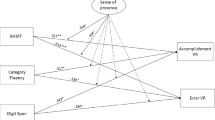Abstract
The paper highlights the relationship between each of four bi-polar dimensions of personality cognitive style, such as extraversion–introversion, sensing–intuition, thinking–feeling and judging–perceiving, and the level of sense of presence experienced. Findings indicate that individuals who are more sensitive, more feeling or more introverted experience a higher level of presence. While not reaching statistical significance, differing cognitive styles appear to impact on task performance. The apparent negative relationship discovered between sense of presence and task performance should be considered in the light of task characteristics. We discuss the implications of these findings and how they contribute to an understanding of the complex relationship that exists between presence and task performance and how this subsequently ought to influence the design of virtual environments.
Similar content being viewed by others
References
Grigorenko E (2000) Cognitive style. In: Kazdin A (ed) Encyclopedia of Psychology. Oxford University Press, Oxford, pp 163–166
Ellis SR (1996) Presence of mind: a reaction to Thomas Sheridan’s further musings on the psychophysics of presence. Presence 5:247–259
Heeter C (1992) Being there: the subjective experience of presence. Presence 1:262–271
Jung CG (1971) Psychological types. In: Ress L, McGuire W (eds) The collected works of C.G. Jung, vol 6. Princeton University Press, Princeton, NJ
Madden J (2001) A language of design using personality theory. In: Proc Symposium on Systems Research in the Arts 2001. http://www.jcrhodes.net/Program--2001.htm. Cited 2 October 2003
Myers IB, McCaulley MH (1998) Manual: a guide to the development and use of the MBTI. Consulting Psychologist, Palo Alto, CA
O’Hare GMP, Sewell K, Murphy A, Delahunty T (2000) ECHOES: an immerse training experience. Adaptive hypermedia and adaptive Web-based systems, LNCS vol 1892. Springer, Berlin Heidelberg New York, pp 179–188
Riding R, Cheema I (1991) Cognitive styles. Educational Psychology 11:193–213
Sadowski W, Stanney KM (2002) Measuring and managing presence in virtual environments. In: Stanney KM (ed) Handbook of virtual environments technology. Erlbaum, London
Sas C, O’Hare GMP (2001) Presence equation: an investigation into cognitive factors underlying presence within non-immersive virtual environments. Presence Workshop 2001, Temple University, Philadelphia. http://astro.temple.edu/~lombard/P2001/Sas.pdf. Cited 24 November 2003
Sas C, O’Hare GMP (2003a) Presence equation: an investigation into cognitive factors underlying presence. Presence 12 (in press)
Sas C, O’Hare GMP (2003b) Impact of cognitive style upon sense of presence. In: Proc 10th international conference on human computer interaction HCII’2003. 22–27 August 2003, Crete, Greece, Erlbaum, London, pp 696–700
Sheridan TB (1992) Musings on telepresence and virtual presence. Presence 1:120–126
Slater M, Linakis V, Usoh M, Kooper R (1996) Immersion, presence and performance in virtual environments: an experiment with tri-dimensional chess. In: Proc VRST’96. ACM, New York, pp 163–172
Author information
Authors and Affiliations
Corresponding author
Rights and permissions
About this article
Cite this article
Sas, C., O’Hare, G.M.P. & Reilly, R. Presence and task performance: an approach in the light of cognitive style. Cogn Tech Work 6, 53–56 (2004). https://doi.org/10.1007/s10111-003-0145-8
Received:
Accepted:
Published:
Issue Date:
DOI: https://doi.org/10.1007/s10111-003-0145-8




